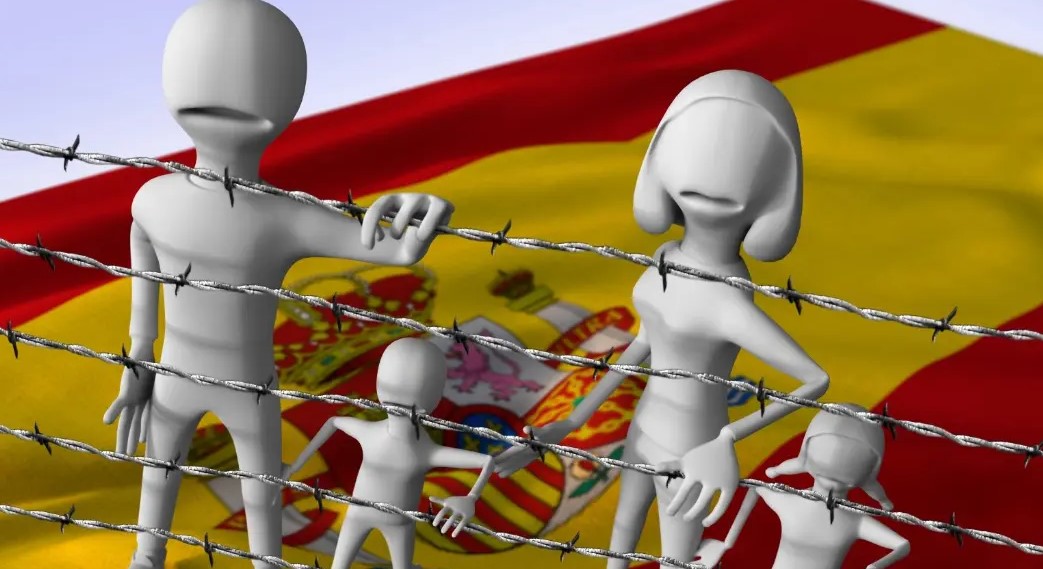Spain is facing an unprecedented migration crisis. Since mid-2018, more than 350,000 illegal immigrants have arrived in the country. This alarming figure, equivalent to the population of major cities like Alicante, highlights a blatant lack of control in migration policy, turning Spain into the main gateway for irregular migration into Europe. Data from UNHCR, the Ministry of Interior, and the General Commissioner for Aliens and Borders confirm this dramatic development.
The Canary Islands and the Balearic Islands have become the epicenters of this humanitarian and security avalanche, on the brink of collapse. The absence of international agreements and the lack of cooperation from countries like Morocco and Algeria exacerbate an already unsustainable situation, caused by the migration policies of both the ruling PSOE and the opposition PP.
An Alarming Balance: 350,000 Entries in Seven Years
The flow of irregular migrants to Spain has reached historic proportions. In 2018, the year of Pedro Sánchez’s arrival in Moncloa, UNHCR recorded a record 65,000 illegal immigrants. More than 80% of these entries occurred under the current socialist government, marking a clear turning point in migration management.
In 2019 and 2020, according to the Ministry of Interior, another 74,000 immigrants entered illegally despite the global health crisis. The year 2021 was marked by a devastating episode: between 12,000 and 14,000 immigrants, encouraged by Morocco, crossed the border into Ceuta in May, increasing the total number of irregular entries to 57,000 for that year. In 2022, arrivals decreased to 31,763, but this calm was short-lived.
In 2023, the number of arrivals in the Canary Islands rose to 57,538, according to UNHCR. The year 2024 broke all current government records with 64,318 illegal immigrants, 73% (46,843) of whom landed in the Canary Islands. By June 20, 2025, 19,260 immigrants have already entered illegally, showing a continuing upward trend with no signs of slowing down.
The Canary Islands: Humanitarian and Security Crisis at its Limit
The Canary Islands have become the epicenter of this crisis, having received almost 160,000 illegal immigrants since 2020, according to data from the General Commissioner for Aliens and Borders. Arrival numbers in the archipelago have been alarming:
- 2020: 23,023 people
- 2021: 22,316 people
- 2022: 15,682 people
- 2023: 39,910 people (an explosive increase of 154%)
- 2024: 46,843 people (a record and 17.4% more than the previous year)
- 2025 (until May): 11,492 immigrants (an increase of 103.5% since 2020)
The migration profile has worryingly evolved. While Senegalese migrants predominated between 2020 and 2023, now Malians from the unstable and jihadism-plagued Sahel region lead the arrivals. This shift poses a serious security risk, as Spanish authorities lack sufficient resources to manage such a massive influx. Morocco’s lack of border control, especially in the coastal regions of Tan-Tan, Tarfaya, and the Saharan coast, further exacerbates the problem.
The Canary Islands, with just 2.2 million inhabitants, are at their capacity limit. The overload of reception centers and the lack of effective solutions have led to a crisis that overwhelms the archipelago’s capacities. The central government’s inaction and the lack of international cooperation have placed the islands in an untenable situation.
Balearic Islands: The Rise of the Algeria Route
While the Canary Islands are in focus, the Balearic Islands have become the second major illegal entry point into Spain. In 2024, according to the National Security Annual Report, 5,882 illegal immigrants arrived in the archipelago. By May 2025, this number rose to 3,272, an increase of 300% compared to the same period last year, as reported by the General Commissioner for Aliens and Borders. The Algeria route, primarily used by Algerian migrants (2,700 in 2025 according to FRONTEX), has made Formentera and Cabrera critical disembarkation points.
Mafia organizations operating with impunity from Algeria have intensified the use of “Pateras-Taxis” – speedboats that transport migrants to the Balearic Islands and then return to North Africa. A recent operation in Ibiza led to the dismantling of one of these networks and the arrest of two Algerian skippers, one of whom had a criminal record for violent robberies. However, given the scale of the problem, these measures are insufficient. The absence of return agreements with Algeria and the inefficiency of the European Union’s migration policy have pushed the Balearic Islands to the brink of collapse.
Devastating Consequences and Outlook
The migration crisis in Spain is the result of a combination of factors: the central government’s inaction, the PP’s neglect, the lack of international cooperation, and the free movement from countries like Morocco and Algeria. While Morocco uses immigration as geopolitical leverage, Algeria, despite sporadic efforts, does not effectively control departures from its coasts. The European Union, for its part, has failed to implement a coordinated strategy, and the European Pact on Migration and Asylum, in force since 2024, has not yet shown tangible results.
The effects of this crisis extend beyond humanitarian concerns. Illegal immigration has led to increased insecurity in many parts of the national territory. At the political level, the proposals of the Socialists and the Popular Party perpetuate the lack of control and offer no sustainable solutions.
With over 350,000 illegal entries since mid-2018, Spain faces a structural challenge that can no longer be treated as a one-off emergency. The overwhelmed Canary Islands and Balearic Islands reflect a broken migration system. Without urgent measures such as strengthening border controls, negotiating effective repatriation agreements with Morocco and Algeria, and increasing resources for state security forces, the country is heading towards a crisis of historic proportions. The crucial question is not whether Spain can withstand more pressure, but for how long it will be able to, until the collapse becomes irreversible.




